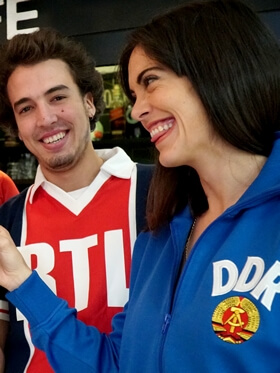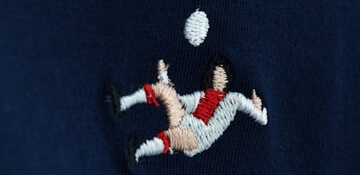What about the German football team? One sentence sums it all up; The German team is the leading European football power of all time and a world benchmark.
Since its creation in 1908 with its first match against Switzerland, the German football team has brought discipline, power, reliability, a team always at the top of all the king's sport championships. The German Football Team has won four World Cups; 1954, 1974, 1990 and 2014, and European champion during the Euro years 1972, 1980, 1996.
Its first international tournament developed in the 1912 Stockholm Olympics where "Die Mannschaft" from the beginnings fell in the first round. In the first decades of its history its future efficiency was not really predictable. His first major ranking was at the 1934 World Cup where the team would finish in third position. From this moment, sporting circumstances are linked to politics; the Third Reich in Germany, the Berlin Olympics of 1936, the Second World War and the separation of the two Germans until the reunification of 1990.
After this reunification, the East German National Team becomes part of the selection for Federal Germany. For this reason, the history of the Federal German team reflects the history of all of Germany with the gap of the years in which it was divided. FIFA and UEFA have recognized that the former East German Football Association (Deutscher Fußball-Verband) will be absorbed by the DFB, the German Football Federation. You can read our report on the interesting history of the selection of the DDR, the German Democratic Republic during the years of the Eastern bloc, we invite you to visit their history to complete this column.
It is also surprising that the greatest triumphs of the German football selection took place during the Iron Curtain era, when there was great rivalry between the two types of state; the communist and the democratic liberal. We should reflect on the rivalries in the sports field knowing that the two blocks were competing not only on the playing field during matches but also in the propaganda machinery. In football as in politics, we can say that West Germany has been successful.
We will list the results of the German Team in the World Cup and in the European Nations Championship, where we will include the victories, their participation in the semi-finals and in the final. This will give us a reliable description of the great competitive strength and performance of The Nationalmannschaft in the most important competitions in the world.
SIGNIFICANT RESULTS OF THE GERMAN FOOTBALL SELECTION AT THE WORLD CUP, EURO AND OLYMPIC GAMES:
TEAM OF GERMANY - WORLD CUPS:
1934 Italy World Cup: Third position
1954 World Cup Switzerland: Winner
1958 World Cup in Sweden: Fourth position
World Cup 1966 England: Finalist, Second position
1970 World Cup Mexico: Third position
World Cup Germany 1974: winner
World Cup Spain 1982: Finalist, Second position
1986 World Cup Mexico: Finalist, Second position
World Cup 1990 Italy: Winner
2002 World Cup Japan and South Korea: Finalist, Second Place
2006 World Cup Germany: Third position
2010 World Cup South Africa: Third place
World Cup 2014 Brazil: Winner
GERMAN TEAM - EUROPEAN FOOTBALL CHAMPIONSHIPS:
EURO 1972 Belgium: Winner
EURO 1976 Yugoslavia: Finalist, Second place
EURO 1980 Italy: Winner
EURO 1988 Belgium: Semi-finalist
EURO 1992 Sweden: Finalist, Second place
EURO 1996 England: Winner
EURO 2008 Austria / Switzerland: Finalist, Second place
EURO 2012 Poland and Ukraine: Semi-finalist
EURO 2016 France: Semi-finalist
TEAM OF GERMANY - OLYMPIC GAMES:
1928 Amsterdam Olympics: Quarter-finals
1936 Berlin Olympics: Quarter-Finals
MYTHICAL PLAYERS FROM THE HISTORY OF GERMAN FOOTBALL
The great German footballers of all time have given us remarkable moments. We want to remember them in this column.
Uwe Seeler, born in 1936, was one of the team's great attackers. His beginnings were marked by his family since his father was also a footballer. Born in Hamburg, he played for the team of his city the Hamburger Sport-Verein from 1954 to 1972, club where during the 1960 season he won the German League, the Bundesliga. He was so appreciated by Hamburg supporters that he never wanted to sign for other teams despite the offers. He only ended his career with Cork in Ireland. He has scored more than 400 goals in these teams. He also participated with the German national team in the World Cups of 1958, 1962, 1966, 1970 but unfortunately did not obtain the victory for the Teutonne team, the best classification being in 1966 when Germany s 'is ranked second. He has the title of captain of honor of the German team after having worn this bracelet 40 times. Seller had a strong nerve and potential, very precise in the execution of the strikes, and not being very large very precise in the headshots. In Hamburg, he was idolized, he was affectionately known as "our Uwe" and he even has a huge sculpture of his foot outside the stadium of the Hamburg club.
Franz Beckenbauer, born in 1945 in Munich, the city where his career will take place, in particular at Club Bayern Munich where he played from 1963 to 1977. He then signed with the New York Cosmos, where he remained 4 seasons until 1980, date he moved to play with Hamburg SV, remaining two seasons between 1980 and 1982. He ended his career in New York in 1983. With Bayern FC, he won four titles in the German Bundesliga championship and three Champions Leagues . He was the architect of the German National Team's triumph at the 1974 World Cup, contested at home, a victory which is the best expression of ecstasy for German football supporters. He had already played in the 1966 and 1970 World Cups. He also won the title of winner of the 1972 European Nations Championship and was a finalist in the 1976 Euro. Among many other distinctions, Beckenbauer, nicknamed the Kaiser, won the Ballon d'Or in 1972 and 1976. The International Federation for Football History and Statistics considers him the best German football player in history. As coach, he led the German team during the 1990 World Cup victory in Italy. His game was elegant, always decisive, extremely fast, a central titan par excellence who played the post of libero.
Karl-Heinz Rummenigge, born in 1955, the German striker has played for Bayern Munich and Inter Milan. With Bayern, he won two Champions League titles in 1975 and 1976 as well as two Bundesliga league titles in 1980 and 1981. With the German National Team Rummenigge won the Euro in 1980 and won was a finalist twice at the World Cups in Spain and Mexico, in 1982 and 1986 respectively. He previously competed in the 1978 Argentina World Cup without much success. He won the Ballon d'Or in 1980 and 1981. He was a very fast, sharp striker, and with his great talent his shots have always found their way to the goal.
Lothar Matthäus, born in 1961, player of an endless career. He played for Borussia Mönchengladbach, Inter Milan and Bayern Munich where he won seven titles in the German league, the Bundesliga. He has the record of participation in the World Cups, in particular in 1982, 1986, 1990, 1994 and 1998, winning the title of champion at the World Cup Italy 1990. He also participated in four Euro, winning the first of 1980 He ended his career as a coach. The midfielder and Libero, nicknamed Loddar, knew the right moment to pass the ball or dribble, he also had a very powerful shot.
The jerseys of the German football team in 1908 by tradition were black with white sleeves following the Prussian color, then from 1930 became white. The second equipment was green, the predominant color of the Deutscher Fußball-Bund, the German Football Federation. The other colors of the second German shirt were black and red. The crest of the imperial eagle appears on the left side, the side of the heart.
From the mid-1980s, as with the jerseys of other European teams, details with the colors of the flag of Germany began to be included to make the jerseys more attractive, leaving aside the simplicity and concision that the shirts of the German selection have always had.
Leuzela, Umbro and Erima were the brands that have dressed the players of the German National Team since the 1950s. The Adidas brand took over as the brand responsible for making the jerseys of the German nation from 1980 .
In our Retrofootball® section, you can visit the shirts of the German National Football Team, "Die Mannschaft", the best team in European football in terms of victories, efficiency and performance. For all fans of the best football of all time.
 Retrofootball
Retrofootball  Belgium
Belgium  France
France  Germany
Germany  Italy
Italy  Portugal
Portugal  Spain
Spain  Switzerland
Switzerland  United Kingdom
United Kingdom  other countries
other countries  Retrorugby
Retrorugby 






Post Comments